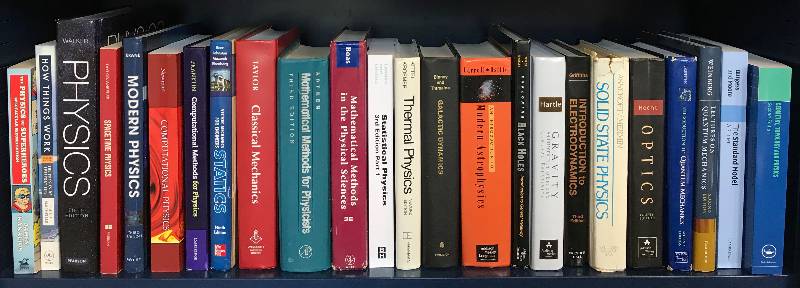This course provides an introduction to the science of climate change. Core topics
include albedo, the greenhouse effect, the carbon cycle, and feedback mechanisms between
these phenomena. Students will study past climates, climate models, and the impacts
of modern climate change. Near the end of the semester students will discuss efforts
to mitigate climate change. They conclude by briefly discussing the most widely adopted
climate change policies. No previous experience with these subjects is assumed.
Gen Ed Attribute: Science Distributive Requirement.
Dr. Morrison
An exploration of the physics of electrical circuits, the chemical basis of electricity
as the flow of electrons, acid-base and oxidation-reduction reactions in chemical
and in chemical and in living systems, the electrical activity in the human nervous
system, and connections between electricity and sensation and locomotion in humans.
Pre / Co requisites: Education majors only.
Dr. Hoang
This class will be geared towards how physics shows up in art and music. Students
will initially study what will seem like basic physics: force and motion, electric
and magnetic fields, periodic oscillations, and wave properties. They will then begin
to focus on light, optics and color, and the human eye. Next, they will focus on sound,
sound production, sound perception, and the organization of sound into musical scales
such that "music" can be constructed.
Gen Ed Attribute: Science Distributive Requirement.
Dr. Morrison
A study of motion, energy, light, and some aspects of modern physics.
Gen Ed Attribute: (SD) Science Distributive Requirement.
Sections:
100-01 Dr. Sawyer
100-02 Dr. Sudol
100-03 Dr. Chyba
An exploration of food and cooking from a physical science perspective. Principles
of soft matter physics (e.g. phase diagram, intermolecular forces, viscosity, diffusion,
self-assembly, polymer physics) are discussed and used to gain insight into food and
cooking.
Gen Ed Attribute: Science Distributive Requirement.
Sections:
123-01 Dr. Aptowicz
123-02 Dr. Aptowicz
An introductory, non-calculus, physics course. Mechanics of solids and fluids, wave
motion, heat and temperature, thermodynamics, and kinetic theory.
Gen Ed Attribute: (SD) Science Distributive Requirement.
Sections:
130-01 Dr. Pfeil
130-02 Dr. Chen
130-03 Dr. Sudol
130-04 Dr. Chen
An extension of PHY 130. Electricity and magnetism, geometrical and physical optics,
and modern physics.
Pre / Co requisites: PHY 140 has a prerequisite of PHY 130.
Sections:
140-01 Dr. Kandalam
140-02 Dr. Thornton
140-03 Dr. Pfeil
An introductory calculus-based physics course. Includes mechanics, kinetic theory,
waves, heat, and thermodynamics. The laboratory emphasizes error analysis, the writing
of technical reports, and data analysis using computers.
Pre / Co requisites: PHY 170 has a prerequisite of MAT 161.
Gen Ed Attribute: (SD) Science Distributive Requirement.
Dr. Waite
A continuation of PHY 170. Includes electricity and magnetism, geometrical and physical
optics, electronics, and modern physics.
Pre / Co requisites: PHY 180 requires prerequisite of PHY 170 and co-requisite of MAT 162.
Gen Ed Attribute: (SD) Science Distributive Requirement.
Dr. Kandalam
Particle kinematics, dynamics, energy, and momentum considerations; oscillations;
central force motion; accelerated reference frames; rigid body mechanics; Lagrangian
mechanics.
Pre / Co requisites: PHY 300 has prerequisites of PHY 140 or PHY 180 and MAT 162.
Dr. Morrison
A lecture and laboratory course designed to familiarize students with experimental
physics and scientific communication. Students conduct experiments, analyze data,
and come to evidence-based conclusions. In addition, explicit instruction occurs on
writing and presenting in the discipline of physics. Students write a scientific report
on an experiment and present their findings to the department.
Pre / Co requisites: PHY 310 has prerequisites of PHY 240 and PHY 175.
Gen Ed Attribute: Speaking Emphasis, Writing Emphasis.
Dr. Aptowicz
Selected topics in mathematics applied to problems in physics, ordinary differential
equations, vector calculus, Fourier analysis, matrix algebra, and eigenvalue problems.
Pre / Co requisites: PHY 370 has prerequisites of PHY 175, PHY 180, MAT 261, MAT 315
or (MAT 311 and MAT 343), or instructor permission.
Dr. Waite
Geometrical and physical optics. Reflection and refraction at surfaces, lenses, interference
and diffraction, and polarization.
Pre / Co requisites: PHY 410 has prerequisites of MAT 261, MAT 315, and PHY 175.
An introductory course in quantum mechanics. Topics covered include the Schrödinger
equation, stationary states, time evolution, position and momentum space wave functions,
bound states, scattering states, spin and orbital angular momentum, hydrogenic atoms,
and entanglement. Additional topics may include perturbation theory, conserved quantities,
particle statistics, and quantum information.
Pre / Co requisites: PHY 420 has a prerequisite of PHY 240 and a corequisite of MAT
370.
Dr. Chen
Electrostatics of point charges and extended charge distributions, fields in dielectrics,
and magnetic fields due to steady currents. Ampere's Law and induced emfs. Topics
in electromagnetic waves as time permits.
Pre / Co requisites: PHY 430 has prerequisites of PHY 300 and MAT 343 or PHY 370.
Dr. Kandalam

